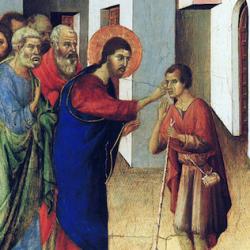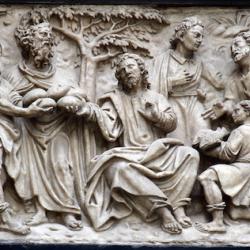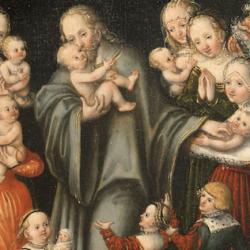In Mark’s gospel, Jesus is the royal “son of God” (1:1), the stronger man who enters into combat with the “strong man” in order to plunder his house (3:20-35). Thus Jesus “casts out” ( ekballo ; cf. 1:34, 39, 43; 3:15, 22, 23; 6:13; 7:26) demons from the outset of His ministry, tossing them out of the house of Israel.
Significantly, Mark identifies the spirits as “unclean.” “Unclean spirit” occurs only once in the Old Testament (Zechariah 13:2) and only twice in Matthew (10:1, 12:43). But that phrase appears repeatedly in Mark (1:12, 26, 27; 3:11, 30; 5:2, 8, 13; 6:7; 7:25; 9:25). In each of the eleven instances when Mark mentions spirits being cast out, they are identified as “unclean.” Jesus’ exorcisms cleanse Israel. As the opening quotation from Malachi indicates, the Messiah comes to purge the Lord’s house. In Mark, that purgation of the house is not just a ceremonial or symbolic purgation, but a purgation of what really defiles, the demons that infest Israel.
Jesus’ moment in the temple is consistent with this Markan theme.
In Mark, Jesus enters the temple twice (11:11, 15-18; cf. Matthew 21:12-17; Luke 19:45-46), first to inspect the house and then to cleanse it. As Duncan Derrett pointed out long ago, Jesus is a priestly inspector, checking first for house leprosy then coming back to see if the leprosy has spread (cf. Leviticus 14:33-53). He judges that the uncleanness of the temple is spreading, and therefore the house needs to be torn down until there is not one stone one another. The language of the temple action highlights the continuity between Jesus’ exorcisms and His action in the temple. He enters the temple and begins to “cast out” ( ekballo ) the sellers. All over the land, synagogues are filled with unclean spirits; at the heart of the land, the temple has become a strong man’s house infested with demonic worshipers.
What defiles the temple is not the sheer fact of a market in clean animals. That is a natural development of the instructions of Deuteronomy 14:22-27. Wright is correct, I think, to say that the temple action is a pre-enactment of the destruction of the temple. But in Mark it is also literally a cleansing. What has polluted the house?
The quotations in Mark 11:17 gives us hints. First, Mark, like the other synoptic writers, quotes from Isaiah 56, who says that the temple is to be a house of prayer for all nations. It’s for Jews and Gentiles, and Jesus charges that the Jews have failed to keep the house for this purpose, specifically by excluding Gentiles. The second quotation is from Jeremiah 7, where the prophet condemns the Jews for treating the temple like a robbers’ den, a safe-haven for violent revolutionaries. Jeremiah doesn’t condemn what they do in the temple, but the fact that they act unjustly elsewhere, and then seek safety in God’s house. Both passages speak of the temple in connection with right actions toward outsiders and the marginal – toward Gentiles, orphans, and widows. And the fact is that Jesus’ attack is specifically directed at the economic activity of the temple: He “began to cast out [like demons] those who were buying and selling in the temple, and overturned the temple of the moneychangers and the seats of those who were selling doves” (Mark 11:15). Though the presence of moneychangers is not itself a defilement, the import is that Jesus is angry about the way temple economics works, and specifically about how it works to damage the weak.
Nick Perrin ( Jesus the Temple ) has argued at length that the temple authorities were guilty of various forms of economic malfeasance and injustice, and had been doing this for centuries. Antiochus wasn’t the only one to commit the sacrilege of stealing money from the temple; the Jewish priests started it. And the resources of the temple had been used in a mafia-like loan system. Perrin writes that embezzled money “that would accrue to the temple leadership through illegal gain could then in turn be quickly turned around for punishingly high-interest-rate loans to the destitute. By being in a position to leverage usurious, high-risk loans, the temple financiers were then able to foreclose quickly and efficiently on landowners struggling to eke out an existence. Increased temple landholdings eventually meant more wealth for the priestly elite, more wealth meant even more high-interest loans, more high-interest loans meant more foreclosures on the land and the cycle went on – crushingly so, for those at the bottom of the economic ladder.”
For Mark, then, the idolatrous uncleanness that infects the temple is greed and the economic oppression that flows from greed. Israel was supposed to be a Sabbatical people, giving relief to slaves and debtors, ensuring that the land reverted eventually to the original owners. They had been sent into exile for failing to keep Sabbath, but in Jesus’ day they are back at it. It is a sign that they are still behaving in the ways that led them into exile at the beginning. The first temple was destroyed because it was not used as a center for Sabbath. Herod’s temple suffers the same fate for the same reasons.
It’s all in Malachi. The messenger is coming to the Lord’s house “like a refiner’s fire and like fullers’ soap” (Malachi 3:2) in order to “purify the sons of Levi and refine them like gold and silver, so that they may present to Yahweh offers in righteousness” (v. 4). Then “the offering of Judah and Jerusalem will be pleasing to Yahweh” (v. 5). This purgation has to take place because Jerusalem has become a habitation of sorcerers, adulterers, liars, and “those who oppress the wage earner in his wages, the widow and the orphan, and those who turn aside the alien” (v. 5). And then immediately Malachi adds that Israel has been “robbing God” in their “tithes and offerings” (vv. 7-12).















